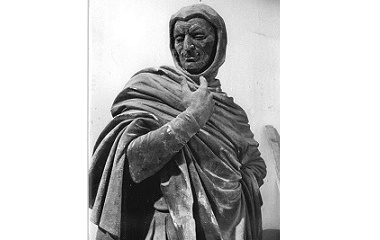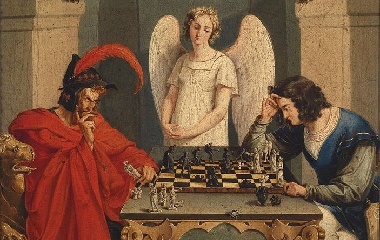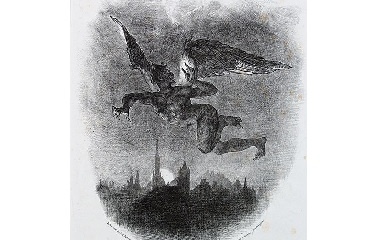Who is Mephistopheles?
One starry night, a German scholar named Faust decided that he would give anything to be able to fully understand and enjoy the world. Turning his back on his Christian upbringing, he called upon the devil to enlighten him, in exchange for which he would give his soul. Instead of Satan, an elegant demon named Mephistopheles appeared—and he was surprisingly reluctant to accept the deal.
Characteristics
Physical Description
Like Faust, Mephistopheles craved importance and elegance before he turned into a demon. These yearnings are reflected in his demonic shape, which is much more human and attractive than the shape of other demons.
Mephisto is usually described as a pale man with dark hair and very sharp features. From his pointed beard to his tapering fingernails and slanted eyebrows, the demon’s features are at once delicate and menacing. His costume enhances his natural appearance. He dresses in fine Renaissance clothing—puffed sleeves and pants, a short cape, a feathered cap, and tights that disappear into pointed shoes—all made of red and black silk. Naturally, his look is completed by a gleaming sword tucked into his belt.
Occassionally, Mephisto appears with some of telltale demonic traits, like curled horns, wings, or a barbed tail.
Personality
In a word, Mephistopheles is—complicated. At the same time that he serves Lucifer and delivers souls to hell, he doesn’t seem to relish his work.
When Mephisto first appears to Faust, he makes his position clear. First, he informs Faust that he does not wander the earth seeking out souls to corrupt. Instead, he claims that he was “just passing by” and sensed that Faust, who had been attempting to magically summon demons, was already on the brink of corruption. Next, Mephisto warns Faust to change his ways, describing the horrors of his own “private hell” to try to convince Faust bargaining with the devil is a bad decision. Unfortunately, Mephisto’s warnings fail. Faust insists that Mephisto should be his slave for twenty-four years, after which he will give his soul to the devil. Eventually, Mephisto accepts.
As Faust’s slave, Mephisto goes above and beyond to make Faust’s sacrifice worthwhile. He brings him wealth, beautiful women, and all sorts of “earthly pleasures.” Most importantly, he takes Faust on grand adventures, even time-travelling and flying to the stars with him, so that he can understand all of creation. Eventually, Faust proclaims, “Had I as many souls as there are stars, I’d give them all for Mephistopheles,” proving that the demon is a pure, never-ending delight.
Of course, Mephisto can’t share Faust’s delight. Even during their most dazzling journeys, he continues to remind Faust that he will regret their twenty-four-years of pleasure when he has to spend an eternity in hell. Mephisto also makes countless cynical observations about humanity and civilization, like “all that comes to be deserves to perish wretchedly; ‘twere better nothing would begin.”
By all appearances, Mephisto is a bitter soul who resents both the devil’s power and humanity’s weakness. After all, if the devil was weaker or people were less strong, Mephisto might not be trapped in a job he hates, a job that dooms other souls to eternal torment.
Still, Mephistopheles is a demon, and you could question his sincerity. Is he really so eager to stop Faust from making a pact with the devil, or are his “warnings” a clever act of reverse psychology. Is he really so disgusted by his work, or is he merely trying to gain Faust’s trust by showing some human compassion?
Cultural Representation
Origin
Mephistopheles and Faust are not just inseparable in legend, they are inseparable in history as well. Mephisto first appears in “Historia von D. Johann Fausten,” a pamphlet published in Germany around 1587 that contains the first known version of the Faust legend. Since history has no other traces of a demon named Mephisto, it appears that he was created as a villain specifically for this tale.
The legend of Faust caught on, and over the next 140 years, eight more pamphlets were published, each of them offering their own take on the deal that went down between Faust and Mephisto. Pamhplets were also translated into several languages and distributed across Europe.
In 1808, Johann Wolfgang von Goethe published Faust, a play that would become the most famous version of the legend. Goethe’s Mephistopheles was significantly different from the Mephistopheles that came before him. He was more bitter against humanity and more eager to claim Faust’s soul. Meanwhile, Faust is more reluctant to accept Mephistopheles—and at the end of the play, Faust is forgiven by the grace of god and carried away to heaven, rather than being consigned to the devil, as he had been in previous versions.
Explanation
Today, Faust’s fame overshadows Mephistopheles. Although many people use the word “faustian” to describe a sacrifice of virtue to gain knowledge, power, or wealth, few people remember the dazzling demon who made that sacrifice so tempting.











Thank you for this insightful article. I really enjoyed reading it!
cool